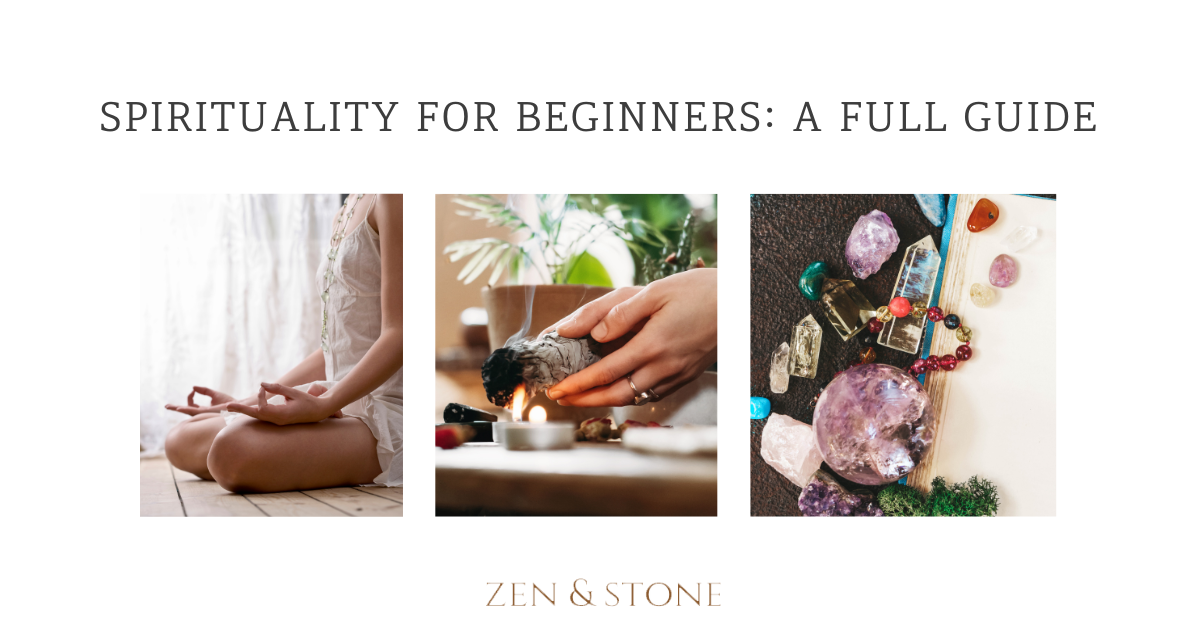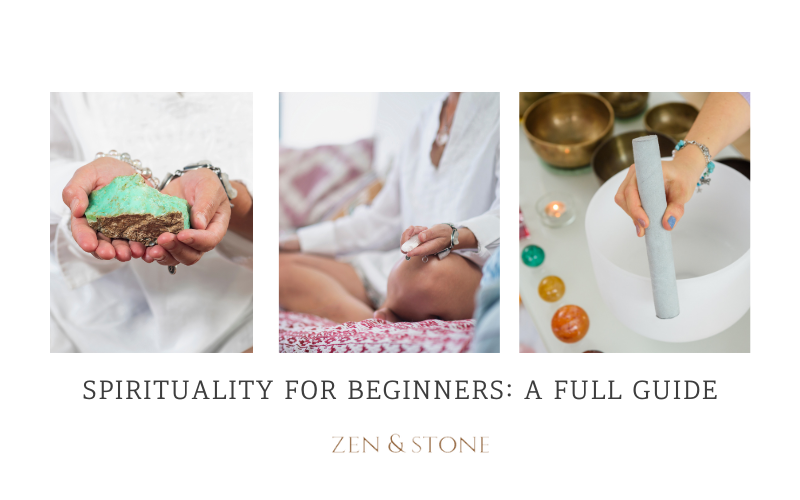
07 Sep Spirituality For Beginners: A Full Guide
Whether you’re experiencing an existential crisis or you’re looking to find inner peace, more purpose in your life, or follow an intuitive feeling of faith – we’ve made a full beginner’s guide to spirituality. Here is everything you need to know about getting started!
What Is Spirituality?
There is no one way to define spirituality. Spirituality is an umbrella term that deals with the beliefs and practices that involve the soul and the spiritual world; such as energy and higher power or divine force.
It can include religion or aspects of religion, but it doesn’t have to. Typically, people who self-describe as spiritual do not concern themselves with the rules of religion, but that isn’t always the case.

How To Practice Spirituality – A Step-by-step Guide
How you practice spirituality is entirely up to you, but the only way to find out what works for you is to explore all of the options – and do so from a healthy place. Let’s take a look at how to get started with a step-by-step guide.
Declutter Your Life
The first step to any spiritual journey always starts with the physical world. In order to be able to focus on your spiritual side, you need your environment to be in order. So, take some time to sort out your home and declutter it of things that aren’t necessary or wanted. You can also do the same with the people or situations in your life if necessary.
Commit To Self-care
Leading on from the first step, you also need to take care of your physical body. Invest your time and money into taking care of yourself. Start up a weekly or daily routine in which you take care of your body. Not only does this set the stage for the non-physical work to begin, but it makes you feel good and ensures that you avoid spiritual bypassing.
Do Shadow Work
Next up – the mind; in order to embark on a spiritual journey, you need to be in a good state of mind. If you struggle with your mental health in any way, you should invest some time into shadow work or therapy to get to the bottom of any deep-seated negative emotions and process any past traumas that might prevent you from moving forward in life.
Shadow work is a spiritual alternative to therapy, in which you map out the things that make you unhappy on paper and link them back to their cause to better understand yourself. You can also write down the things that you want to change about your life, as well as how to change them, and then make a priority list that you can get to work on.
Practice Mindfulness
Practicing mindfulness is also important to ground you in the present, physical moment and improve your awareness, as well as your capacity for stillness, which is important for developing spiritually.
Connect With Nature
In order to connect with your spiritual side, you also need to connect with nature. Whichever spiritual path you end up taking, it will undoubtedly connect with the world around you, so get a head start by spending time in nature by going out for walks, exploring the great outdoors, and engaging with the elements and animals.
Be Open
In order to start your spiritual journey, you need to be open-minded. Spirituality depends on faith, so to really commit to your spiritual awakening, you need to abandon your ego and let go of any limiting thoughts, or belief systems revolving around the scientific explanation.
Explore The Possibilities
Next, do as much research as possible and look into as many religions and non-religious belief systems as you can. Read spiritual books and articles, watch spiritual videos, movies, and TV shows, listen to podcasts, and be open to the experiences of different people.
The seven main religions of the world are Christianity, Judaism, Islam, Hinduism, Buddhism, Sikhism, and Animism, whilst non-religious spirituality includes many of the elements of both the Western and Eastern religions, such as God or Gods, the soul, the afterlife, chakras, auras, and energies, as well as spiritual laws like the law of attraction and karma.
This step should never really stop. Even when you choose your path, you should keep researching and exploring spirituality.
Choose Your Path
Upon doing your research, choose and follow the path which seems right to you. Bear in mind, that this doesn’t have to be one thing or another; you can follow whatever naturally resonates with you.
If that means different aspects of different religions or belief systems, go for it! Listen to your intuition and do what feels right to you.
Meditate Or Pray
The next thing that you should try is meditation and/or prayer. Depending on whether you have chosen a path that includes personal power or worship of a higher power, (or both), you should connect with that power through meditation and/or prayer.
There are many different types of meditation and prayer, so do your research and try what resonates with you, starting with something simple first, of course. Not only will this strengthen your connection with the divine, but it will also strengthen your intuition and help you to narrow or expand your path.
Invest In Tools
In addition to meditation and/or prayer, you should invest in some spiritual tools to amplify your energy and help you along your path to spiritual enlightenment. Depending on your path, this could include religious books, symbols, prayer tools, incense sticks, crystals, essential oils, sacred herbs, candles, or tarot cards.
Try Rituals
Next, why not try doing a ritual? Rituals and spiritual traditions include attending a place of worship, casting spells, manifestation, invoking certain energies, and performing energy cleanse. There are several types of spiritual practices out there, so get researching and have fun.
Protect Yourself
If you’re engaging in something non-religious, be sure to protect yourself from dark energies and don’t attempt anything that you don’t feel ready for. Do your research into protecting your energy with prayer, angels, spiritual tools, and personal power.
Seek Out Other Spiritual People
Another great way to explore spirituality is to seek out other people with similar beliefs. Whether that’s going to a place of worship, joining a coven, or seeking out spiritual content online to continue growing, learning, and connecting.
Persist
If you don’t feel like you’re experiencing any spiritual growth at first, keep going! All of our spiritual journeys are different, and how quickly you progress depends on many things which are all unique to you. So, relax, consider divine timing, and don’t give up.
Track Your Progress
Track the progress of your personal journey in a diary to be aware of just how far you’ve come. If the changes are gradual, it can be difficult to know when and if your life has changed without a clear record to look back at – so be sure to make a note whenever you have a spiritual experience or notice some kind of change in yourself or your life.
You can also use this space to write a list of the things you want to get from your enlightenment and plan your progression.
Have Fun
Finally, have fun! The primary reason for embracing spirituality is to get more out of life, so it should be enjoyable! Don’t push yourself to do anything that doesn’t feel natural, right, or positive, and doesn’t fret if something doesn’t click the way you thought it would. Mistakes are all a part of the learning process.
Conclusion
If you’re looking to be a more spiritual person, we encourage you to follow our guide to spirituality for beginners. However you interpret spirituality, we’ve got you covered. Take care, be gentle with yourself, and enjoy the process.

Sorry, the comment form is closed at this time.